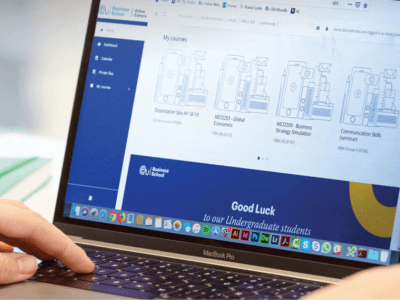Empowering Future Leaders: 10 Habits Practiced by Successful Business Owners
It is often assumed that successful business owners work relentlessly and that, in order to be successful, they must be willing to sacrifice a normal schedule. However, interviews with these individuals reveal that a manageable work-life balance and sensible self-care routines are in fact fundamental to the daily lives of many.
Personal development books that claim to help readers achieve the mindset of the business elite have become incredibly popular. Although every leader has their own approach, below we have listed 10 habits commonly practiced by successful business owners.
1. Design a morning routine that serves you
How you spend your morning has a huge impact on your mindset for the rest of the day. It’s better to wake up a little earlier to enjoy a leisurely morning than to hit snooze on your alarm and start the day in a stressful rush. Ray Castellanos from the Feed Your Wolf podcast has stated that mornings should be about conscious rituals instead of mere reactions. Think about the habits that promote positive thinking and incorporate them into your routine. Potentially beneficial additions include exercise, meditation, journalling, and listening to peaceful music. Remember, food is fuel. The importance of a nourishing breakfast cannot be overstated.
2. Organize your activities
When our brains are crowded with pressing matters, it can be difficult to focus on any one task long enough to complete it. Founder of Vyper, Jack Paxton, relies on a strict schedule. To follow suit, start the day with a list of everything you have to do, and then use a numerical or color-coding system to prioritize it. One good way to begin is by completing the quickest and easiest task first. Removing an item from your to-do list straight away can be an excellent boost to your motivation. At the end of the day, revise your list and begin tomorrow’s by adding any outstanding tasks.
3. Stop multitasking
On busy days, there is the temptation to attempt multiple tasks at once. This can be a false economy, according to entrepreneur Spencer Rascoff, who co-founded Zillow and Hotwire.com. Distracted people are more prone to making careless mistakes which may require additional work to repair. Building strong relationships with business contacts also requires complete attention and sincere engagement. Sending emails during a work lunch may initially seem like a good use of time; however, you’re much more likely to miss information that could lead to important future opportunities. Overall, it’s better to give full focus to one task at a time.
4. Use technology sensibly
Technology can be an excellent tool for efficiency, but it can also enable procrastination and heighten stress levels. It may be useful to set limits on your use of certain apps so you can avoid wasting time. Forbes has reported that most Fortune 500 CEOs don’t use social media, which may explain why they’re so able to focus on their business growth. Instead of passive scrolling, download apps which serve your personal and professional objectives, for example fitness trackers or organizational aids. One sensible use of technology could be to set routine reminders for mundane tasks. This clears brain space, empowering you to focus on your objectives.
5. Practice mindfulness
It used to be associated mainly with Buddhism; however, now people of all faiths and none have incorporated mindful meditation into their daily routine. Executive life coach Cha Teleki strongly recommends it to her business clients. The benefits are obvious: regular mindfulness practice relieves stress, improves quality of sleep, lowers blood pressure and improves concentration and clarity. There are many free guided meditations available online. Even just a 10 minute practice per day can have a positive impact on both physical and mental health.
6. Carry a notebook
The CEO of Nike, Mike Parker, knows that great ideas often arrive at the most inopportune moments, like while you’re on public transport or in the middle of a gym class. That’s why he always carries a notebook. This way, you can jot things down while they’re fresh in your mind. Often people are sure they will remember their idea perfectly, yet when they return to it later the details are so vague that it becomes worthless. Having a portable notebook avoids this frustrating experience, and it means you have a list of potential projects on your person at all times, which is perfect if you end up meeting a useful contact to pitch during the day. Entrepreneur
7. Schedule rest
When schedules are busy, rest tends to be demoted to our last priority, which increases the risk of burnout. Making rest a regular part of your schedule is a fantastic preventative measure that will keep you in peak condition to meet the rest of your commitments. Resma Sujuana, the CEO of Girls Who Code, ensures that rest is factored into her daily activities, and she chooses how to spend it spontaneously each day. You should resist the urge to make rest time “productive”. Instead, make it a real period of rest. That means if you choose to read, you should read for pleasure and escapism only. Business-related books do not apply. Other options include watching lighthearted television or even enjoying a refreshing afternoon nap.
8. Recharge in nature
Nature is extremely restorative, which means there are many mental and physical benefits to be enjoyed when you spend time outdoors. To take full advantage, you should disconnect entirely from technology during this time. Bill Gates is known to spend vacations in a remote cabin, entirely secluded from the world. You don’t have to go that far. Rather than listen to a podcast or loud music while you walk, simply try to absorb your environment, noticing the sights and sounds that surround you. Make sure you take your notebook, as spending time in nature is known to be a source of sudden inspiration. It’s a very energizing way to take a break between tasks.
9. Display your goals
While focusing on the minutiae of the day-to-day, it’s easy to disconnect from the bigger picture. However, our objectives are usually our main source of motivation. Without checking in on them regularly and reflecting on the reasons behind our hard work, there is a risk that we lose the drive to continue. To address this, display your goals prominently in a place where you will see them every day. This could be on a post-it note stuck to your computer screen or on a more elaborate vision board, as recommended by executive coach Tara Swart, who has worked with Linkedin, Stanford Business School and Samsung. Make sure the wording and imagery you use to represent them is positive and encouraging for maximum motivational effect.
10. Release surplus energy
The pressures of daily life can accumulate quickly, especially during periods of increased stress; for example, when you have an urgent deadline. It’s important to develop methods of letting off steam and include them in your routine so that you maintain the necessary mental clarity to complete your projects. Many successful business owners, such as Oprah Winfrey and Tim Cook, exercise daily to achieve this. Keeping an exercise routine has the additional benefit of helping build self-discipline, a transferable skill which can also be usefully applied in the workplace.
By incorporating these habits into your own lifestyle, you too can create a solid foundation for developing a successful career in business. Far from promoting a workaholic lifestyle, this guidance emphasizes the importance of balance, rest and self-care for those who wish to fulfil their ambitions in the business world. Students can also benefit from applying this approach to their daily routines.










